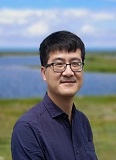
Prof. Qinmin Yang
Zhejiang University, China
Speech Title:Novel Stackelberg-Game-Based Energy Storage Sharing Scheme Under Demand Charge
Abstract:
Demand
response (DR) using shared energy storage systems (ESSs) is an
appealing method to save electricity bills for users under demand charge
and time-of-use (TOU) price. A novel Stackelberg-game-based ESS sharing
scheme is proposed and analyzed in this study. In this scheme, the
interactions between
selfish users and an operator are characterized as a Stackelberg game.
Operator holds a large-scale ESS that is shared among users in the form
of energy transactions. It sells energy to users and sets the selling
price first. It maximizes its profit through optimal pricing and ESS
dispatching. Users purchase some energy from operator for the reduction
of their demand charges after operator’s selling price is announced.
This game-theoretic ESS sharing scheme is characterized and analyzed by
formulating and solving a bi-level optimization model. The upper-level
optimization maximizes operator’s profit and the lower-level
optimization minimizes users’ costs. The bi-level model is transformed
and linearized into a mixed-integer linear programming (MILP) model
using the mathematical programming with equilibrium constraints (MPEC)
method and model linearizing techniques. Case studies with actual data
are carried out to explore the economic performances of the proposed ESS
sharing scheme.
Biography
Qinmin Yang received the Bachelor's degree in Electrical Engineering from Civil Aviation University of China, the Master of Science Degree in Control Science and Engineering from Institute of Automation, Chinese Academy of Sciences, and the Ph.D. degree in Electrical Engineering from the University of Missouri-Rolla.He has been an advanced system engineer with Caterpillar Inc., and a Post-doctoral Research Associate at University of Connecticut. Since 2010, he has been with the State Key Laboratory of Industrial Control Technology, the College of Control Science and Engineering, Zhejiang University, China, where he is currently a professor. He has also held visiting positions in University of Toronto and Lehigh University. He has been serving as an Associate Editor for IEEE Transactions on Systems, Man, and Cybernetics: Systems, IEEE Transactions on Neural Networks and Learning Systems, Transactions of the Institute of Measurement and Control, Processes, and Automatica Sinica. His research interests include intelligent control, renewable energy systems, smart grid, and industrial big data.